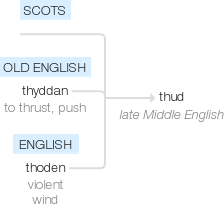Thud
late Middle English (originally Scots): probably from Old English thyddan ‘to thrust, push’; related to thoden ‘violent wind’. The noun is recorded first denoting a sudden blast or gust of wind, later the sound of a thunderclap, whence a dull, heavy sound. The verb dates from the early 16th century.
wiktionary
From Middle English thudden(“to strike with a weapon”), from Old English þyddan(“to strike, press, thrust”), from Proto-Germanic *þuddijaną, *þiudijaną(“to strike, thrust”), from Proto-Germanic *þūhaną, *þeuhaną(“to press”), from Proto-Indo-European *tūk-(“to beat”). Cognate with Old English þoddettan(“to strike, push, batter”), Old English þȳdan(“to strike, stab, thrust, press”), Old English þēowan(“to press”), Albanian thundër(“a hoof, talon, a shaft", figuratively, "oppression, torment”).
etymonline
thud (v.)
Old English þyddan "to strike, stab, thrust, press," of imitative origin. Sense of "hit with a dull sound" first recorded 1796. Related: Thudded; thudding. The noun is attested from 1510s as "blast of wind;" 1530s as "loud sound."
